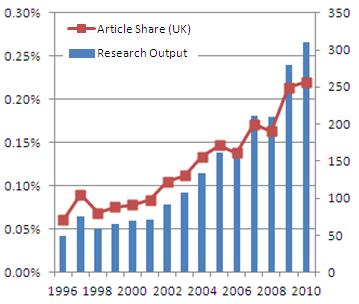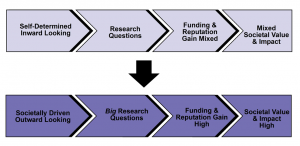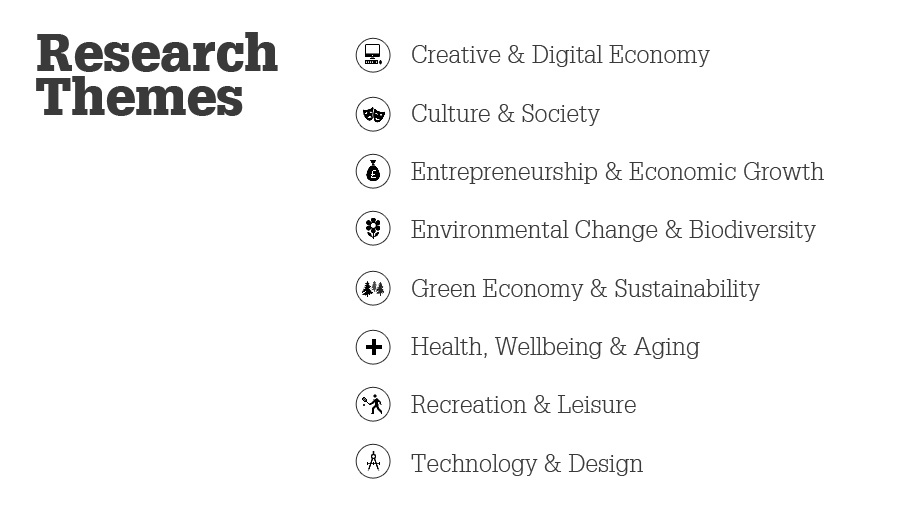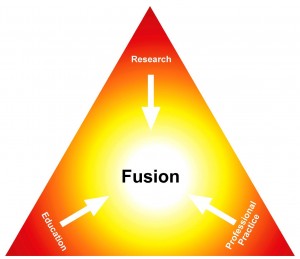Over the last decade, but particularly in the last five years, BU has matured into a university with a strong research track record with some of the most talented researchers anywhere in the world. It is a fantastic success story and one to be justifiably proud. Take a look at the graph which shows the growth in our published output as depicted by Scopus data; it truly something! Our output has grown at a rate of over 13% compared to 3.7% for the UK as a whole.
 RAE2008 was a milestone in this journey – the fourth most improved University was the well-deserved headline! There is much to shout about but we also have to think carefully about how we can continue this trajectory building on this foundation.
RAE2008 was a milestone in this journey – the fourth most improved University was the well-deserved headline! There is much to shout about but we also have to think carefully about how we can continue this trajectory building on this foundation.
To do this we will need to find more income. Our research income per academic FTE remains modest at around £6.5k compared to a sector average of £50k per FTE. To grow our research base further we need to up our game. You may ask why? Well to make another step change and ensure that we are not just left in the stocks as a teaching-only university as the sector shifts in the coming years we need to grow our learning community of research students, research assistants and post-doctoral fellows which are the lifeblood of a successful research active university. To do this we will need to attract much more external research income. It is not, however, just a question of bidding more, but critically of increasing the quality of our bids and thereby our success rates.
There are many reasons why a shift to a research culture driven by societal need is important, not least of which is to give something back as a public institution to society, but it is also important to ensure our ability to bid more successfully for funds in the future. Let me use my own career as an illustration. My first passion is glacial geology and I spent much of the 1990s studying the esoteric discipline of sediment transport in Arctic glaciers. It was a fantastic period in my life in which I was perpetually scraping together funds for my next field trip and never more at home than on some frozen glacier. Money was not easy to come by because in truth there was little funding available for such work, to be blunt it has little or no societal relevance. It was not until I joined BU in 2002 that I started to reinvent my research direction working for the first time in the field of contaminated land as an environmental geologist and starting to work first in Central America and then in Africa on aspects of human evolution. During this second part of my career my success rate with Research Councils increased three-fold, as did the total amount of research income I generated. In essence I shifted from a field with little societal relevance to one with huge value. My passion for research remains but is just directed slightly differently! At the heart of this story is the fact that I was able to transfer my skills as sedimentologist – someone who studies dirt – from one discipline to another.
Within BU we have a lot of active and talented researchers some of whom are working in fields of societal importance but some whom are not, preferring to pursue their own, often narrow, research agenda. By shifting to a more societal focus for the majority of our research our ability to generate income and achieve societal impact is likely to be much greater and this is a shift that we need to make together over the next year or so. A shift which is something that is essential if we are to make BU2018 a reality.

During the last year BU has been through a process of defining societal research themes and it is worth refreshing ourselves about this journey. The initial candidate set of themes was generated from a trawl of all the priority funding areas for all major research funding bodies (Research Councils, European Commission, major charities, etc). This list was debated and refined by the BU Professoriate and subject to an all staff survey, in which candidate themes where put to the public vote. The remaining ten themes were scoped out and defined and then whittled to eight earlier this year via debate on this blog. These are the research themes on which BU has chosen to focus its societal research effort. But crucially they are still up for debate, evolution and further discussion. To this end I recently invited all staff to an event on the 14 December 2011 at which the research themes will be scoped further and networks of researchers created. If you have not signed up yet I would encourage you to do so!
To register your place at the Fusion Event on 14 December complete this form:






 Some possibilities:
Some possibilities:













 Beyond Academia: Exploring Career Options for Early Career Researchers – Online Workshop
Beyond Academia: Exploring Career Options for Early Career Researchers – Online Workshop UKCGE Recognised Research Supervision Programme: Deadline Approaching
UKCGE Recognised Research Supervision Programme: Deadline Approaching SPROUT: From Sustainable Research to Sustainable Research Lives
SPROUT: From Sustainable Research to Sustainable Research Lives BRIAN upgrade and new look
BRIAN upgrade and new look Seeing the fruits of your labour in Bangladesh
Seeing the fruits of your labour in Bangladesh ECR Funding Open Call: Research Culture & Community Grant – Apply now
ECR Funding Open Call: Research Culture & Community Grant – Apply now ECR Funding Open Call: Research Culture & Community Grant – Application Deadline Friday 12 December
ECR Funding Open Call: Research Culture & Community Grant – Application Deadline Friday 12 December MSCA Postdoctoral Fellowships 2025 Call
MSCA Postdoctoral Fellowships 2025 Call ERC Advanced Grant 2025 Webinar
ERC Advanced Grant 2025 Webinar Update on UKRO services
Update on UKRO services European research project exploring use of ‘virtual twins’ to better manage metabolic associated fatty liver disease
European research project exploring use of ‘virtual twins’ to better manage metabolic associated fatty liver disease